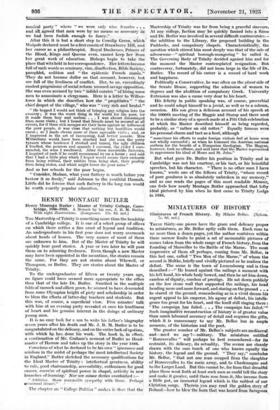HENRY MONTAGU BUTLER
Henry Montagu Butler : Master of Trinity College, Cam- bridge, 1886-1918. A Memoir by his son, J. R. M. Butler. With eight illustrations. " (Longmans. 12s. 6d. net.) THE Mastership of Trinity is something more than the headship of a Cambridge college. It is one of a select group of offices on which there settles a fine crust of legend and tradition. An undergraduate in-'his first year does not worry overmuch about beads of houses. The very names of most of them are unknown to him. But of the Mister of Trinity he will quickly hear good stories. A year or two later he will pass them on to admiring freshmen. ' Even ;though a pew Master may have been appointed in the meantime, the stories remain the same. For they are not stories about Whewell, or Thompson, or Butler. They are stories about the Master of Trinity.
To the undergraduates of fifteen or twenty years ago, no figure could have seemed more appropriate to the office than that of the late Dr. Butler. Swathed in the multiple folds of cassock and silken gown, he seemed to have descended from some Olympian height of piety and scholarship in order to bless the efforts of latter-day teachers and students. But this was, of course, a superficial view. Five minutes' talk with him at an evening party revealed at once his kindliness of heart and his genuine interest in the doings of ordinary young men.
It is no easy task for a son to write his father's biography seven years after his death and Mr. J. R. M. Butler is to be congratulated on the delicacy, and on the entire lack of egotism, with which he /ins. done his work. The book is, in effect, a continuation of Mr. Graham's account of Butler as Head- master of Harrow and takes up the story in the year 1886.
Conscious of what he declared to be his own " ignorance and sciolism in the midst of perhaps the most intellectual Society in England," Butler sketched the necessary qualifications for the Ideal Master of Trinity : intellectual -greatness, ability to rule, good chairmanship, accessibility, enthusiasm for good causes, exercise of spiritual power in chapel, activity in new branches oftlearning:' Nor' are minor dirties overlobked :-
" Athletics. Show reasonable sympathy with these. Perhaps occasional dinner."
The chapter on " College Politics " makes it clear that the
Mastership of Trinity was far from being a graceful sinecure. At any college, faction May be qUickly fanned into a flame and Dr. Butler was involved in several difficult controversies—
the addition to the Library, the proposed building in the Paddocks, and compulsory chapels. CharacterisfiCally; the question which stirred him most deeply was that of the sale of advowsons—" spiritual borough-mongering " he called it. The Governing Body of Trinity decided against him and for the moment the Master contemplated resignation. But controversy, fortunately, did not loom large in the-life of Dr. Butler. The record of his career is a record of hard work and happiness.
Politically a Conservative, he was often on the placet side of the Senate House, supporting the admission of women to degrees• and the abolition of compulsory Greek. University Extension was also a cause very dear to his heart.
His felicity in public speaking was, of course, proverbial and he could adapt himself to a jovial, as well as to a solemn, occasion. His son gives a delicious account of his speech at the 1000th meeting of the Magpie and Stump and there used to be a similar story of a speech made at a Pitt Club celebration at which the Master described himself as being regarded, probably, as " rather an old rotter." Equally famous were his personal charm and tact as a host, although " -
"sometimes his efforts to make foreign visitors feel at honie were not wholly successful ; as when he hummed the Austrian' national anthem for the benefit of a Hungarian theolegian. The Magyar, however, took no offence, and said later that -the Master represented in appearance his ideal of Moses and St. John."
But what gave Dr. Butler his position in Trinity and in Cambridge was not his courtesy, or his tact, or his beautiful speeches, but his character. " There is no other. man I have known," wrote one of the fellows of Trinity, "whose record of pure goodness is so absolutely unbroken in my memory," and as one reads the pages of this most readable Memoir, one feels how nearly Montagu Butler approached that lofty ideal pictured by him when he first came to Trinity Lodge in 1886.














































 Previous page
Previous page